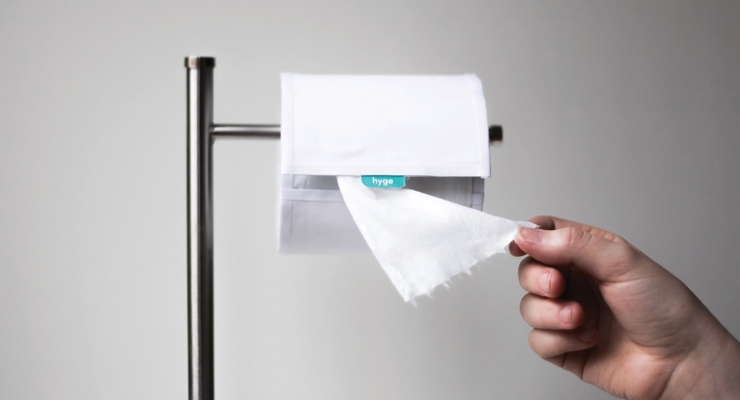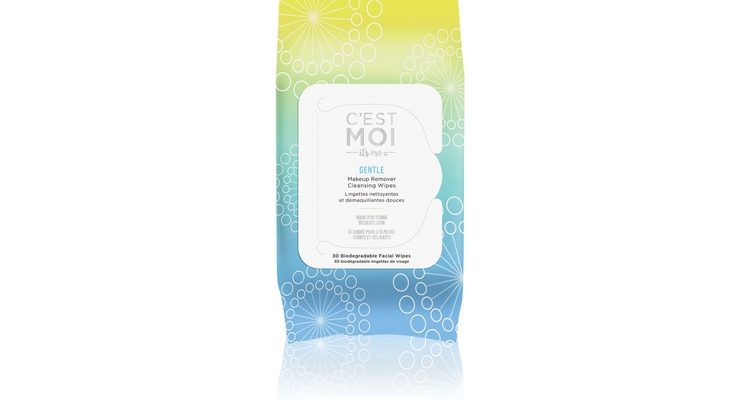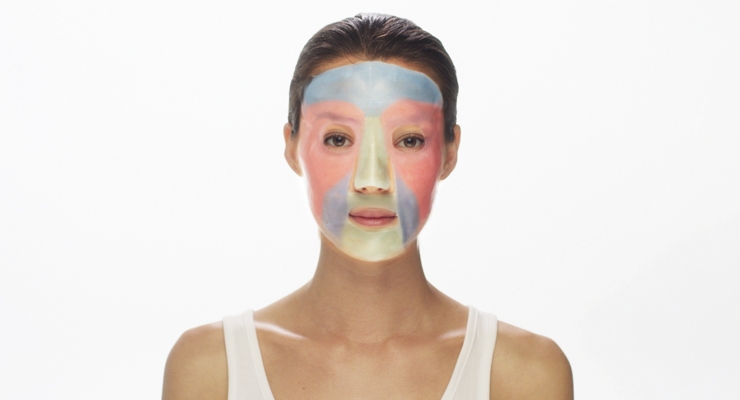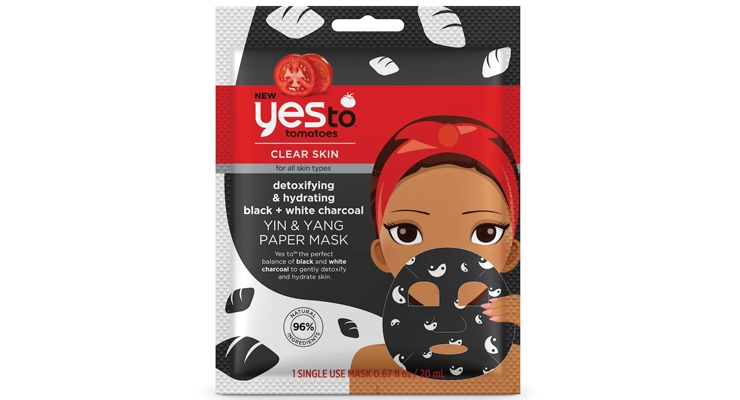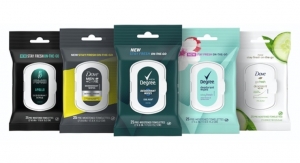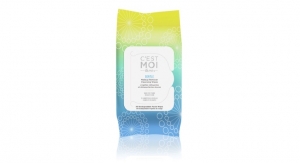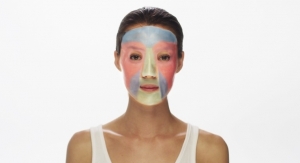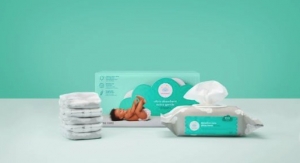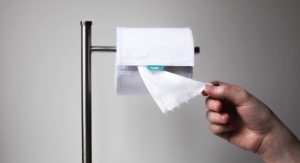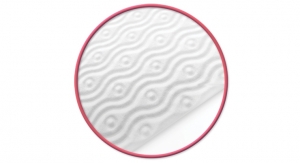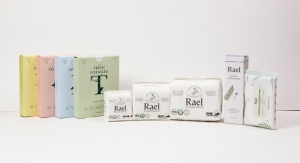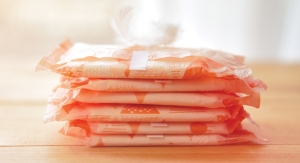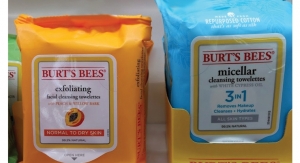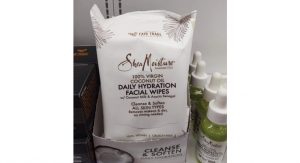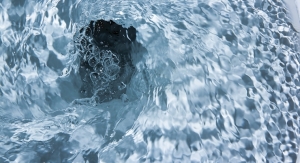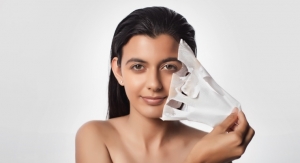Tara Olivo, Associate Editor02.08.19
While baby wipes still dominate the personal care wipes market, new uses for wipes continue to help brands grow sales and attract new customers. However, balancing cost, performance, convenience and sustainability continue to be a delicate task for manufacturers.
In 2018, North American (U.S. and Canada) retail sales for baby wipes were $1.8 billion, while cosmetic wipes (namely facial cleansing wipes) followed behind at $529 million in retail sales, according to data from Euromonitor International.
“Cosmetic wipes do well,” says Svetlana Uduslivaia, head of Home & Tech Americas at Euromonitor International. “While there’s nothing bombastic in this market where it’s seeing significant growth, particularly in developing markets where wipes are still growing at a slow pace, facial wipes have done fairly well.”
While cosmetic wipes, as well as most other personal care wipes categories, are expected to grow over the next several years, pricing still remains a challenge.
“Consumers really want wipes to be cheaper, and a lot of the wider use of baby wipes—just the fact that they can be used for wider applications and they’re cheaper—remains an issue for pricing, and this is a factor for all wipes categories,” Uduslivaia admits.
In developing markets, wipes are still a pricey discretionary purchase. This, combined with low incomes, makes wipes primarily consumed by high-income households in these markets, she says. In developed markets, however, the acceptance and household penetration is much wider, but there are still pricing challenges from both consumers and retailers. “There are situations where the retailers are purchasing from suppliers and then selling them at a price that is not advantageous to suppliers, so they’re not making any money,” Uduslivaia adds.
The flushable wipes category comes with its own set of challenges. In particular, these wipes get the share of the blame for clogging up water treatment systems when in fact it’s other objects such as baby wipes, paper towels and tampons that are clogging up pipes.
While negative media attention on wipes has impacted consumer perceptions to some extent, the category does well when there are marketing pushes or product expansions from the main brands, according to Uduslivaia. “If you start looking at social media, the debate [on flushability] is definitely there, but there is still a strong marketing push from the branded products and people are still open to buying them.”
When the economy is in a good place or picks up, there might be some more spending on discretionary products in this category, she adds, but there are also consumers who are not welcoming the category on the basis of the potential environmental impact. “They would be the ones who are paying more attention to any legal challenges, to ingredients, to all these debates around what is environmentally friendly, are they truly flushable and how does that impact the perception of other wipes.”
Despite any challenges the flushable category faces, it is still growing. In North America, moist toilet wipes grew $4 million in retail sales between 2017 and 2018, reaching $470 million. The category is expected to hit $543 million in retail sales by 2023.
A new startup company in the U.S. is hoping to benefit from this potential growth in the market. Last month, the Michigan-based company Hyge announced the development of its biodegradable wet wipes on a roll.
Hyge, which fits on existing toilet paper holders, is made with fully biodegradable cellulose fibers specifically designed to be flushed without causing septic or sewer issues. According to the company, one Hyge roll is equivalent to seven traditional toilet paper rolls. The company also claims one tree provides 288 more Hyge rolls than traditional toilet paper, reducing deforestation and working toward a cleaner future.
“Wet wipes are gaining popularity as people become aware of hygiene and waste issues that come with traditional toilet paper. People often confuse explicitly non-flushable wipes with those that can be flushed, creating dangerous environmental waste,” says Hyge co-founder Brent Fisher. “By focusing on cleanliness, biodegradation, flushability and design, Hyge is the solution for sustainable hygiene with hassle-free convenience.”
Following a campaign on Kickstarter, Hyge will be available for one-time purchase and also a recurring monthly subscription starting at $10 per month.
Innovation Rolls On
Smaller applications, ranging from makeup remover wipes to body wipes and deodorizers, are bringing nonwoven wipes into new areas, and many brands—big and small—continue to expand their offerings in order to make their customers’ lives easier.
C’est Moi, a beauty brand created for tweens and teens, recently launched its Gentle Cleansing Collection of cleansing gel and lotions that also includes makeup remover cleansing wipes.
The Gentle Skin Care Collection contains calming and soothing formulas that work to cleanse, protect and balance moisture within the skin. Ingredients include organic aloe, calendula, extracts of strawberry, cucumber, kiwi and apple, green tea, as well as chamomile water, organic sweet almond oil, and Shea butter.
Jennifer Saul, vice president of marketing at C’est Moi, says that on the go cleansers and makeup remover wipes have seen tremendous growth within the skin care category. “There is strong demand for convenient and portable solutions that are gentle on the skin and eyes, but also effectively remove dirt and makeup easily on-the-go,” she adds.
Meanwhile, Derma E, a natural, clean beauty skin care brand, recently launched Vitamin C Brightening Micellar Wipes. The new 100% biodegradable wipes gently exfoliate the skin while lifting away makeup, oil, and impurities. They’re made from an anti-oxidant rich formula that includes Vitamin C, to help support collagen health and brighten the skin, Vitamin B3 to help reduce the appearance of inflammation, redness, and premature aging, and licorice extract to help support even skin tone, reducing the appearance of UV-induced hyperpigmentation.
According to Derma E’s chief marketing officer Barbara Roll, Derma E has one of the only biodegradable skin care wipes in beauty. “We wanted to promote this as an option and in our high performing Vitamin C line where you not only have the benefit of cleansing, removing makeup, but brightening and enriching the skin with a non-oxidizing, highly effective Vitamin C form option in a environmentally friendly, 100% biodegradable cleansing wipe.”
The brand believes the convenience of the wipe makes it a lasting and important part of a morning skin care routine, she adds.
Many other cosmetic and skin care brands have complemented new product ranges with wipes. Recent launches include EO’s Certified Organic Deodorant Wipes in bright Tea Tree and timeless Lavender, Pacifica’s Underarm Deodorant Wipes with Coconut Milk & Essential Oils, wet n wild’s Hit The Showers Face & Body Cleansing Wipes that remove dirt, oil, makeup and sweat, and Jafra Royal’s Boost Cleanse + Tone Wipes, which gently remove all traces of makeup, sunscreen, oil and grime without stripping sensitive skin.
On the baby care front, Target recently launched sensitive care baby wipes as part of its Cloud Island private label brand. The new wipes were designed with 99% water and plant-based ingredients, keep out common irritants and include a touch of organic coconut oil for moisturizing.
According to Euromonitor’s Uduslivaia, strong modern retailers have the capacity to build and develop private label and wipes have done fairly well in this space. “It’s good news for the category because they help to support the penetrations since they can typically be reasonably priced, but it’s probably not good news for the brands because they’re pushing prices down. A lot of hygiene manufacturers right now are operating on very tight margins and obviously pricing is something that has been a headache for a lot of them.”
Face Value
Another personal care market that’s consuming nonwovens is facial sheet masks. Today there is a huge range of nonwoven-based masks available that are saturated with skin care formulations that do everything from hydrating and moisturizing skin to providing anti-acne and anti-aging solutions. As the category continues to attract consumers, more and more brands are launching their own versions of this popular skin care treatment.
American skin care veteran Neutrogena unveiled its most personalized skin care product ever, the Neutrogena MaskiD, at the Consumer Electronics Showcase (CES) in Las Vegas last month. The Neutrogena MaskiD is a patent-pending, 3D-printed sheet mask powered by user data that delivers clinical efficacy.
Michael Southall, head of R&D Innovation, says the sheet mask will be made from renewable materials – skin care active ingredients, a hydrating hydrogel made from locust beans and red seaweed, and a nonwoven support for fit and comfort.
“Facial sheet masks are a familiar and enjoyable experience for consumers. Masks are hugely popular around the world. In 2017, the value of the global face mask market surpassed $6.4 billion,” Southall says. “Sheet masks were an obvious choice for our first foray into data-driven, personalized skin care products as they are an effective vehicle for skin care ingredients by creating a physical barrier to lock in nourishing ingredients and saturates the skin to help the ingredients work with the skin.”
Personalization with the Neutrogena MaskiD happens in three ways – first with the shape of the mask itself. Using a smartphone 3D camera, the user simply snaps a selfie to create a precise, multi-dimensional map of their face and the exact measurements and shape of their nose, space between the eyes, lips, and other unique physical characteristics.
Next, personalized data from the Neutrogena Skin 360 system creates the virtual equivalent of a knowledgeable dermatologist and analyzes the skin’s needs, making a recommendation for what ingredients will be most beneficial and where. Finally, using a proprietary 3D printing process, high-efficacy ingredients are printed onto the custom-fit hydrogel mask on the exact zones of the mask where they will deliver the greatest benefit for that individual.
Neutrogena MaskiD will be sold exclusively on Neutrogena.com to consumers in the U.S. beginning in Q3 of this year.
Celebrity facialist and skin care expert Joanna Vargas, meanwhile, launched her first assorted mask set that contains five of her concentrated specialty sheet mask treatments.
The Eden Instant Lift Mask is an advanced hydration treatment mask that diminishes the appearance of wrinkles and promotes the youthful vitality of the skin. The Forever Glow Anti-Aging Face Mask is a hydrating face mask that helps firm and smooth skin to instantly diminish the appearance of fine lines and wrinkles. The Dawn Face Mask is a Mandelic Acid treatment mask that delicately exfoliates skin to leave it soft, smooth, even and refreshed, and the Twilight Face Mask is a deep conditioning mask that delivers Epidermal Growth Factor to promote optimal vibrance and skin resilience. Finally, the Bright Eye Hydrating Mask is a concentrated specialty treatment mask that detoxifies and tones the delicate area around the eyes.
“I created this set to give a mask solution for any skin care concern,” Vargas says. “Each packet in this go-to set contains extra serum; use it on your décolleté, arms, legs, or anywhere you can use an extra boost of hydration.”
Natural products company Yes To is also expanding in the sheet mask space. The brand recently launched new products under its Yes To Tomatoes Detoxifying Charcoal line. Yes To’s Tomatoes Yin & Yang Detoxifying & Hydrating Black & White Charcoal Paper Mask is formulated for the ultimate detox to draw out pore-clogging dirt, oil and impurities, while hydrating dry and sensitive skin and enhancing moisture. The other masks target specific zones of the face. The Yes To Tomatoes Detoxifying Charcoal Acne Fighting T-Zone Mask and Detoxifying Charcoal Acne Fighting Chin Mask offer targeted acne treatments infused with charcoal, salicylic acid and tomatoes. The masks help treat pimples and blackheads on the most acne-prone areas of the face.
In 2018, North American (U.S. and Canada) retail sales for baby wipes were $1.8 billion, while cosmetic wipes (namely facial cleansing wipes) followed behind at $529 million in retail sales, according to data from Euromonitor International.
“Cosmetic wipes do well,” says Svetlana Uduslivaia, head of Home & Tech Americas at Euromonitor International. “While there’s nothing bombastic in this market where it’s seeing significant growth, particularly in developing markets where wipes are still growing at a slow pace, facial wipes have done fairly well.”
While cosmetic wipes, as well as most other personal care wipes categories, are expected to grow over the next several years, pricing still remains a challenge.
“Consumers really want wipes to be cheaper, and a lot of the wider use of baby wipes—just the fact that they can be used for wider applications and they’re cheaper—remains an issue for pricing, and this is a factor for all wipes categories,” Uduslivaia admits.
In developing markets, wipes are still a pricey discretionary purchase. This, combined with low incomes, makes wipes primarily consumed by high-income households in these markets, she says. In developed markets, however, the acceptance and household penetration is much wider, but there are still pricing challenges from both consumers and retailers. “There are situations where the retailers are purchasing from suppliers and then selling them at a price that is not advantageous to suppliers, so they’re not making any money,” Uduslivaia adds.
The flushable wipes category comes with its own set of challenges. In particular, these wipes get the share of the blame for clogging up water treatment systems when in fact it’s other objects such as baby wipes, paper towels and tampons that are clogging up pipes.
While negative media attention on wipes has impacted consumer perceptions to some extent, the category does well when there are marketing pushes or product expansions from the main brands, according to Uduslivaia. “If you start looking at social media, the debate [on flushability] is definitely there, but there is still a strong marketing push from the branded products and people are still open to buying them.”
When the economy is in a good place or picks up, there might be some more spending on discretionary products in this category, she adds, but there are also consumers who are not welcoming the category on the basis of the potential environmental impact. “They would be the ones who are paying more attention to any legal challenges, to ingredients, to all these debates around what is environmentally friendly, are they truly flushable and how does that impact the perception of other wipes.”
Despite any challenges the flushable category faces, it is still growing. In North America, moist toilet wipes grew $4 million in retail sales between 2017 and 2018, reaching $470 million. The category is expected to hit $543 million in retail sales by 2023.
A new startup company in the U.S. is hoping to benefit from this potential growth in the market. Last month, the Michigan-based company Hyge announced the development of its biodegradable wet wipes on a roll.
Hyge, which fits on existing toilet paper holders, is made with fully biodegradable cellulose fibers specifically designed to be flushed without causing septic or sewer issues. According to the company, one Hyge roll is equivalent to seven traditional toilet paper rolls. The company also claims one tree provides 288 more Hyge rolls than traditional toilet paper, reducing deforestation and working toward a cleaner future.
“Wet wipes are gaining popularity as people become aware of hygiene and waste issues that come with traditional toilet paper. People often confuse explicitly non-flushable wipes with those that can be flushed, creating dangerous environmental waste,” says Hyge co-founder Brent Fisher. “By focusing on cleanliness, biodegradation, flushability and design, Hyge is the solution for sustainable hygiene with hassle-free convenience.”
Following a campaign on Kickstarter, Hyge will be available for one-time purchase and also a recurring monthly subscription starting at $10 per month.
Innovation Rolls On
Smaller applications, ranging from makeup remover wipes to body wipes and deodorizers, are bringing nonwoven wipes into new areas, and many brands—big and small—continue to expand their offerings in order to make their customers’ lives easier.
C’est Moi, a beauty brand created for tweens and teens, recently launched its Gentle Cleansing Collection of cleansing gel and lotions that also includes makeup remover cleansing wipes.
The Gentle Skin Care Collection contains calming and soothing formulas that work to cleanse, protect and balance moisture within the skin. Ingredients include organic aloe, calendula, extracts of strawberry, cucumber, kiwi and apple, green tea, as well as chamomile water, organic sweet almond oil, and Shea butter.
Jennifer Saul, vice president of marketing at C’est Moi, says that on the go cleansers and makeup remover wipes have seen tremendous growth within the skin care category. “There is strong demand for convenient and portable solutions that are gentle on the skin and eyes, but also effectively remove dirt and makeup easily on-the-go,” she adds.
Meanwhile, Derma E, a natural, clean beauty skin care brand, recently launched Vitamin C Brightening Micellar Wipes. The new 100% biodegradable wipes gently exfoliate the skin while lifting away makeup, oil, and impurities. They’re made from an anti-oxidant rich formula that includes Vitamin C, to help support collagen health and brighten the skin, Vitamin B3 to help reduce the appearance of inflammation, redness, and premature aging, and licorice extract to help support even skin tone, reducing the appearance of UV-induced hyperpigmentation.
According to Derma E’s chief marketing officer Barbara Roll, Derma E has one of the only biodegradable skin care wipes in beauty. “We wanted to promote this as an option and in our high performing Vitamin C line where you not only have the benefit of cleansing, removing makeup, but brightening and enriching the skin with a non-oxidizing, highly effective Vitamin C form option in a environmentally friendly, 100% biodegradable cleansing wipe.”
The brand believes the convenience of the wipe makes it a lasting and important part of a morning skin care routine, she adds.
Many other cosmetic and skin care brands have complemented new product ranges with wipes. Recent launches include EO’s Certified Organic Deodorant Wipes in bright Tea Tree and timeless Lavender, Pacifica’s Underarm Deodorant Wipes with Coconut Milk & Essential Oils, wet n wild’s Hit The Showers Face & Body Cleansing Wipes that remove dirt, oil, makeup and sweat, and Jafra Royal’s Boost Cleanse + Tone Wipes, which gently remove all traces of makeup, sunscreen, oil and grime without stripping sensitive skin.
On the baby care front, Target recently launched sensitive care baby wipes as part of its Cloud Island private label brand. The new wipes were designed with 99% water and plant-based ingredients, keep out common irritants and include a touch of organic coconut oil for moisturizing.
According to Euromonitor’s Uduslivaia, strong modern retailers have the capacity to build and develop private label and wipes have done fairly well in this space. “It’s good news for the category because they help to support the penetrations since they can typically be reasonably priced, but it’s probably not good news for the brands because they’re pushing prices down. A lot of hygiene manufacturers right now are operating on very tight margins and obviously pricing is something that has been a headache for a lot of them.”
Face Value
Another personal care market that’s consuming nonwovens is facial sheet masks. Today there is a huge range of nonwoven-based masks available that are saturated with skin care formulations that do everything from hydrating and moisturizing skin to providing anti-acne and anti-aging solutions. As the category continues to attract consumers, more and more brands are launching their own versions of this popular skin care treatment.
American skin care veteran Neutrogena unveiled its most personalized skin care product ever, the Neutrogena MaskiD, at the Consumer Electronics Showcase (CES) in Las Vegas last month. The Neutrogena MaskiD is a patent-pending, 3D-printed sheet mask powered by user data that delivers clinical efficacy.
Michael Southall, head of R&D Innovation, says the sheet mask will be made from renewable materials – skin care active ingredients, a hydrating hydrogel made from locust beans and red seaweed, and a nonwoven support for fit and comfort.
“Facial sheet masks are a familiar and enjoyable experience for consumers. Masks are hugely popular around the world. In 2017, the value of the global face mask market surpassed $6.4 billion,” Southall says. “Sheet masks were an obvious choice for our first foray into data-driven, personalized skin care products as they are an effective vehicle for skin care ingredients by creating a physical barrier to lock in nourishing ingredients and saturates the skin to help the ingredients work with the skin.”
Personalization with the Neutrogena MaskiD happens in three ways – first with the shape of the mask itself. Using a smartphone 3D camera, the user simply snaps a selfie to create a precise, multi-dimensional map of their face and the exact measurements and shape of their nose, space between the eyes, lips, and other unique physical characteristics.
Next, personalized data from the Neutrogena Skin 360 system creates the virtual equivalent of a knowledgeable dermatologist and analyzes the skin’s needs, making a recommendation for what ingredients will be most beneficial and where. Finally, using a proprietary 3D printing process, high-efficacy ingredients are printed onto the custom-fit hydrogel mask on the exact zones of the mask where they will deliver the greatest benefit for that individual.
Neutrogena MaskiD will be sold exclusively on Neutrogena.com to consumers in the U.S. beginning in Q3 of this year.
Celebrity facialist and skin care expert Joanna Vargas, meanwhile, launched her first assorted mask set that contains five of her concentrated specialty sheet mask treatments.
The Eden Instant Lift Mask is an advanced hydration treatment mask that diminishes the appearance of wrinkles and promotes the youthful vitality of the skin. The Forever Glow Anti-Aging Face Mask is a hydrating face mask that helps firm and smooth skin to instantly diminish the appearance of fine lines and wrinkles. The Dawn Face Mask is a Mandelic Acid treatment mask that delicately exfoliates skin to leave it soft, smooth, even and refreshed, and the Twilight Face Mask is a deep conditioning mask that delivers Epidermal Growth Factor to promote optimal vibrance and skin resilience. Finally, the Bright Eye Hydrating Mask is a concentrated specialty treatment mask that detoxifies and tones the delicate area around the eyes.
“I created this set to give a mask solution for any skin care concern,” Vargas says. “Each packet in this go-to set contains extra serum; use it on your décolleté, arms, legs, or anywhere you can use an extra boost of hydration.”
Natural products company Yes To is also expanding in the sheet mask space. The brand recently launched new products under its Yes To Tomatoes Detoxifying Charcoal line. Yes To’s Tomatoes Yin & Yang Detoxifying & Hydrating Black & White Charcoal Paper Mask is formulated for the ultimate detox to draw out pore-clogging dirt, oil and impurities, while hydrating dry and sensitive skin and enhancing moisture. The other masks target specific zones of the face. The Yes To Tomatoes Detoxifying Charcoal Acne Fighting T-Zone Mask and Detoxifying Charcoal Acne Fighting Chin Mask offer targeted acne treatments infused with charcoal, salicylic acid and tomatoes. The masks help treat pimples and blackheads on the most acne-prone areas of the face.


